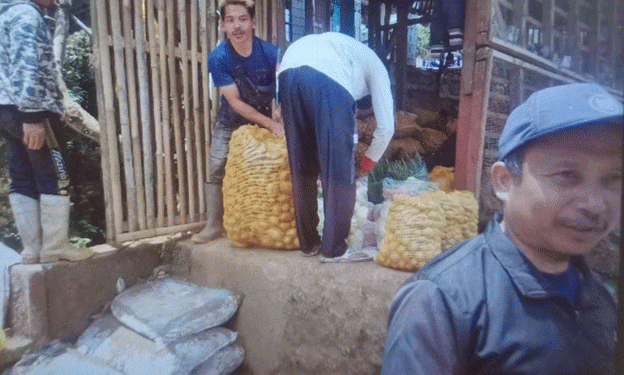My recent visit to Kertasari, Bandung, on October 26, 2024, left a profound impression of community spirit and extraordinary economic potential. As far as the eye could see, lush green fields of thriving potato plants painted the landscape. Potato farming has become the backbone of the local economy, significantly impacting village growth.
Upon entering Kertasari, I was welcomed by expansive potato fields, where vibrant green stalks symbolized the residents’ commitment to harnessing their natural resources. The rich aroma of fertile soil and the gentle mountain breeze added to the tranquil atmosphere, making me feel intimately connected to nature.
A Catalyst for Economic Growth
Interactions with local farmers enriched my understanding of potato cultivation’s vital role in their welfare. They enthusiastically shared stories of how potatoes transformed their lives. Many relied solely on traditional crops, but intensive potato farming has led to substantial income increases. According to a recent report by the Food and Agriculture Organization (FAO), the global potato market is expected to grow at a CAGR of 3.5% from 2023 to 2028, indicating a robust demand for this staple crop.
The Kertasari potatoes have not only become a local food source but have also penetrated broader markets. High productivity and quality have made these potatoes highly sought after, positively influencing village economic growth through increased farmer incomes and the emergence of supporting businesses such as potato processing, packaging, and transportation.
Job Creation and Community Development
Moreover, potato farming has created new job opportunities. The entire process—from planting, maintenance, and harvesting to marketing—requires a significant labor force. This demand has contributed positively to reducing unemployment in the area.
The rise in potato production in Kertasari has led to an increase in labor needs. Skilled workers are essential for land preparation, planting, plant care, harvesting, and post-harvest activities such as sorting and packaging. This not only provides local residents with decent job opportunities but also improves their living standards.
Additionally, the growing potato processing industry has opened up further job avenues. Factories require personnel to operate machinery, oversee quality control, and package final products, thereby fostering supportive businesses like transportation, warehousing, and packaging.
Supporting Industries and Economic Diversification
The growth of potato farming has also stimulated various supporting industries, including organic fertilizer production, agricultural equipment rental, and potato processing. As the demand for high-quality potatoes increases, supporting businesses have emerged around Kertasari’s agricultural area. Farmers, recognizing the importance of soil fertility, have initiated organic fertilizer production, which is environmentally friendly and improves yield quality.
Furthermore, the demand for modern agricultural equipment such as tractors and planting machines has risen, promoting rental services that help farmers save costs and enhance productivity. The potato processing industry has also seen remarkable growth, with farmers turning their produce into snacks like potato chips and instant mashed potatoes, creating additional revenue streams.
Enhanced Village Revenue and Infrastructure Development
The increased production and income of potato farmers have significantly contributed to the village’s revenue, allowing for investments in infrastructure, public facilities, and overall community well-being.
The rise in potato production has positively impacted the local economy, leading to a notable increase in the village’s Original Local Revenue (PAD). Agricultural taxes, land and building taxes, and local levies have become key revenue sources for the village. The increased PAD provides financial capacity to support various development programs.
Increased funds can be allocated to build infrastructure that supports agriculture, such as rural roads and irrigation systems, as well as essential public facilities like health clinics and schools, enhancing overall community welfare.
Environmental Sustainability and Quality of Life Improvements
Beyond economic gains, potato farming promotes environmental conservation and improves community quality of life. Sustainable practices like organic fertilizer use, crop rotation, and soil conservation prevent erosion and enhance water availability.
The success of potato farming in Kertasari has led to better living standards. With more stable incomes, residents can access health care, education, and other basic needs more effectively. Improved health care facilities enable better disease prevention, while enhanced educational opportunities pave the way for brighter futures for local children.
Building Social Capital
Potato cultivation fosters community ties and cooperation among farmers, enabling knowledge and resource sharing to achieve optimal results. The collaborative nature of potato farming encourages mutual assistance, enhancing social cohesion.
Farmers actively exchange knowledge and experiences, forming cooperatives that facilitate better farming practices and pest management strategies, thereby boosting productivity and output quality.
Future Challenges and Opportunities
Despite its benefits, potato farming in Kertasari faces challenges such as climate change, pest infestations, and price fluctuations. However, with support from the government, research institutions, and the farmers themselves, these challenges can be addressed.
Looking ahead, there are numerous opportunities to enhance productivity and value-added production of Kertasari potatoes.
- Development of Superior Varieties: Through plant breeding programs, new potato varieties can be developed that yield higher outputs and are resistant to pests and diseases.
- Modern Technology Adoption: Technologies like drip irrigation and precision agriculture can improve efficiency and reduce production costs.
- Product Processing Expansion: Potatoes can be transformed into high-value products, such as chips and flour, increasing profitability for farmers.
- Broader Marketing Strategies: Expanding the market reach of Kertasari potatoes to national and international levels can significantly increase farmers’ income and boost local economic growth.
Potato farming in Kertasari has demonstrated that agriculture can be a promising sector that enhances community welfare. With collaborative efforts and innovative approaches, Kertasari’s potato cultivation can continue to thrive and serve as a successful model for other regions in Indonesia.







